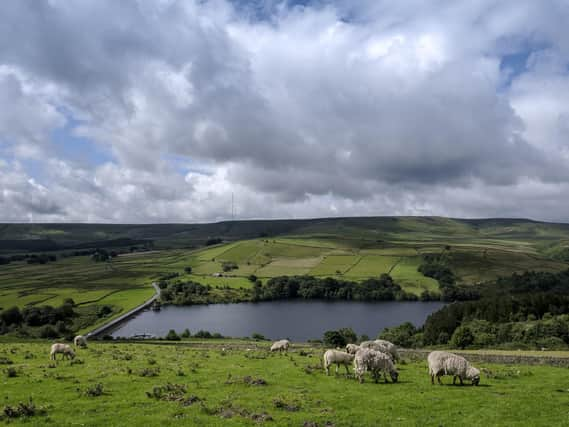New report calls for farmer's "crucial role" in maintaining the countryside and landscapes to be properly supported by the Agricultural Bill payment system


The Landscape and Access Report, published today by the NFU, sets out how the new Environmental Land Management Scheme (ELMS), which will replace the former EU subsidy system, must be accessible to all farmers and reward them for their part in maintaining and improving the landscape.
The report highlights areas such as public rights of way and days out, reporting that 48 per cent of visits to a natural outdoor environment take place on farmland.
Advertisement
Hide AdAdvertisement
Hide AdSpeaking at the launch of the report, NFU president Minette Batters, a beef farmer, said access to the countryside had become particularly relevant during the recent pandemic with more people using it as a way to benefit their mental health as well as exercise. “I think Covid has been a big game changer,” Mrs Batters said.
“We have a footpath on our farm and I have never seen it so busy, which I am delighted about. During lockdown I spoke to a number of people who said being able to walk in the countryside had been a lifeline for them. It made me aware of my role as a farmer not only to producing food but as a custodian of the countryside.”
The new report follows on from the NFU’s 2018 farmed environment publication and outlines five key policy ‘asks’ from the Government.
These are, that the future ELMS scheme, part of the new Agriculture Bill, must be “open and accessible to all farmers”, simple to navigate and giving a “fair reward” for maintaining and improving landscape features such as stone walls, traditional farm buildings and public access.
Advertisement
Hide AdAdvertisement
Hide AdWhere landscape scale impact is desirable, projects must be developed and led by farmers who have the local knowledge of what works in that location.
Incentives should be offered for the conservation of carbon resources as well as their enhancement which can be achieved through the provision of bigger hedgerows, more woodland and carbon-rich soils. All of this will also help deliver agriculture’s 2040 net zero ambition.
Protected landscape bodies should actively recognise and support the thriving, viable farm businesses that manage their landscape. This should also take the Glover review recommendations – the report published last year, which looked at the next steps for National Parks and Areas of Outstanding Natural Beauty in the UK– into consideration.
And a “modern and adaptable” public access network that meets the needs of users and farm businesses should be developed.
Advertisement
Hide AdAdvertisement
Hide AdWith the Agricultural Bill currently in the House of Commons on its way to becoming law, Mrs Batters said we were at a “pivotal time” for the future of farming and the countryside.
“We are already doing so much for the environment, but with the right policies in place we can do so much more.
“Whether it is incentives to conserve carbon through the soil, manage bigger hedgerows or plant more woodland, we do need policies that work together to support the delivery of agriculture’s net zero ambition and to ensure we have a farmed environment that can both feed the nation and thrive with wildlife.”
Support The Yorkshire Post and become a subscriber today.
Your subscription will help us to continue to bring quality news to the people of Yorkshire. In return, you'll see fewer ads on site, get free access to our app and receive exclusive members-only offers.
Advertisement
Hide AdAdvertisement
Hide AdSo, please - if you can - pay for our work. Just £5 per month is the starting point. If you think that which we are trying to achieve is worth more, you can pay us what you think we are worth. By doing so, you will be investing in something that is becoming increasingly rare. Independent journalism that cares less about right and left and more about right and wrong. Journalism you can trust.
Thank you
James Mitchinson